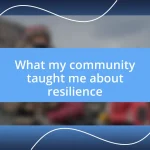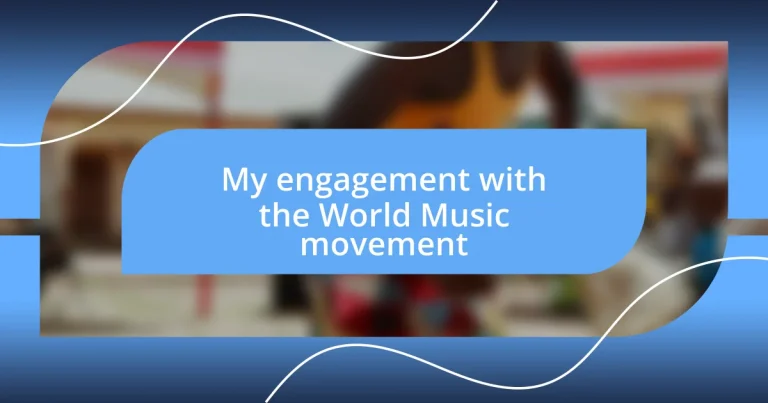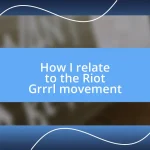Key takeaways:
- The World Music movement bridges cultural gaps and fosters collaboration among diverse artists, creating a shared understanding of humanity through music.
- Technological advancements and globalization have transformed World Music genres, leading to innovative fusions that celebrate cultural exchange and hybrid identities.
- Participating in World Music events promotes community, dialogue, and deeper connections with different cultures, highlighting music’s role as a universal language.
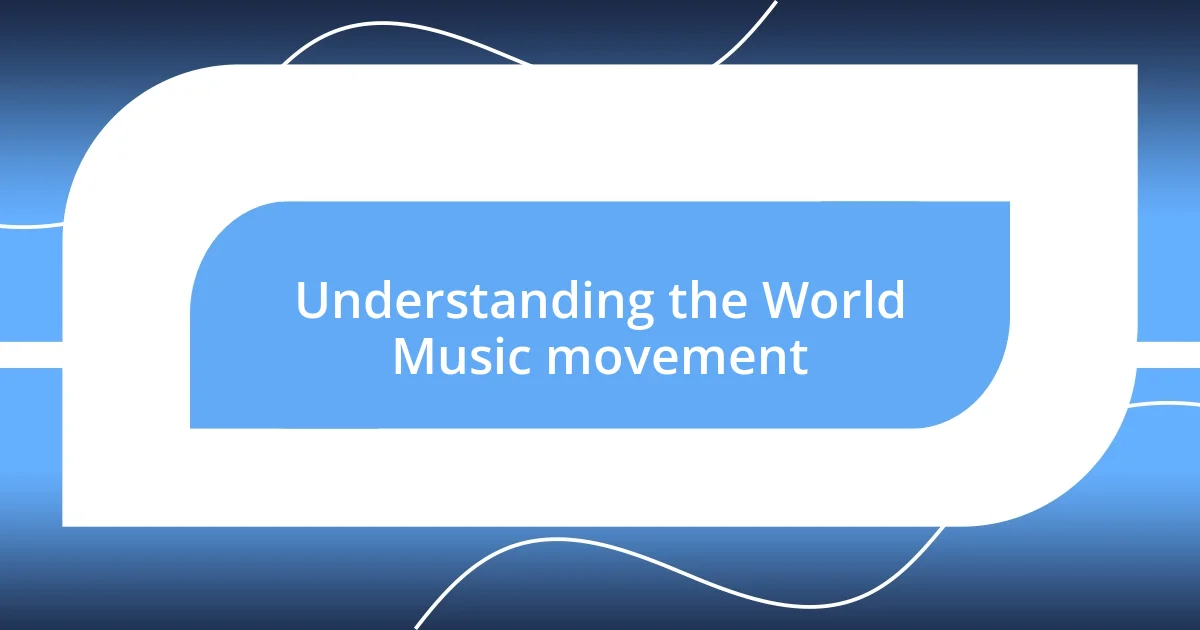
Understanding the World Music movement
Understanding the World Music movement is like opening a door to a vibrant tapestry of cultures. I remember the first time I stumbled upon an album featuring traditional African drumming; the energy was infectious, and I couldn’t help but wonder how such sounds could intertwine with my daily life. It was a revelation that music isn’t just notes and rhythms—it’s a shared language that transcends borders.
When I think about World Music, what strikes me is how it challenges the conventional notions of genres. I often find myself reflecting on how a blend of styles—like the fusion of jazz with Indian classical music—managed to speak to my emotions on a deeper level. Have you ever experienced a song that made you feel profoundly connected to a culture you’ve never visited? Those moments seem to bridge gaps that words alone cannot.
The beauty of the World Music movement lies in its encouragement for collaboration among artists from different backgrounds. One of my favorite memories is attending a festival where musicians from all corners of the globe came together on one stage. There, I saw firsthand how music fosters understanding and connection, creating a unique experience that highlights our shared humanity. Isn’t it fascinating how a single melody can echo stories from countless lives?
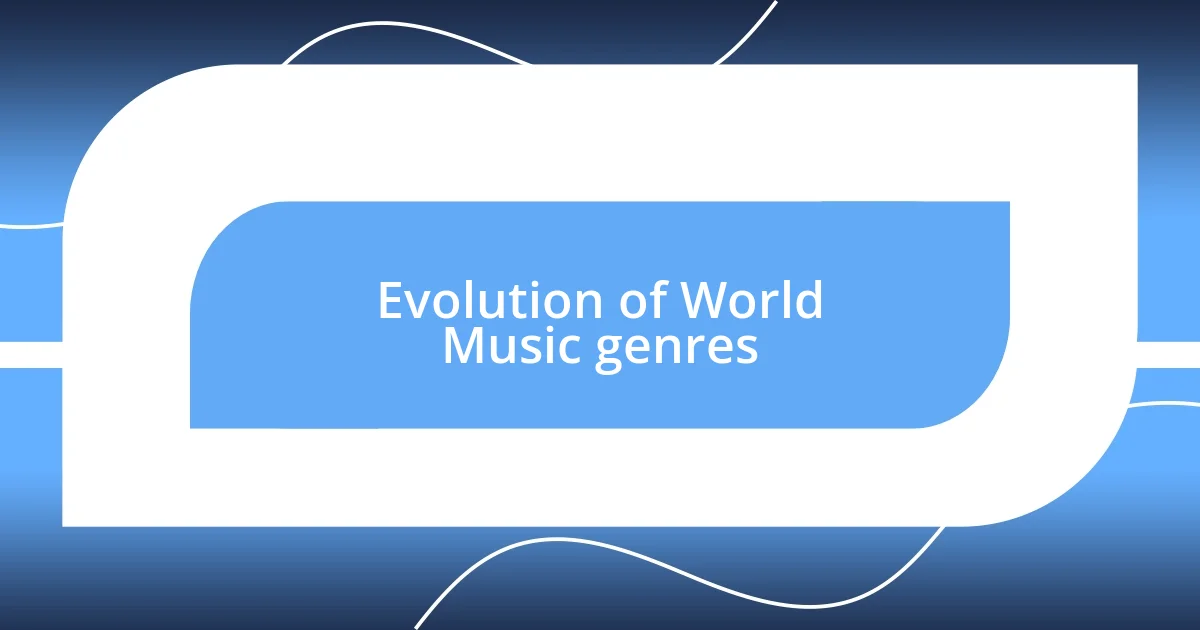
Evolution of World Music genres
The landscape of World Music genres has transformed dramatically over the decades. Initially, many genres emerged rooted in traditional folk sounds and rhythms unique to their cultures, but as globalization progressed, these genres began to fuse in unexpected ways. For instance, I recall the excitement I felt attending a concert where a traditional Irish band collaborated with African musicians. The seamless blend of instruments created an electric atmosphere that truly showcased how diverse influences can celebrate a unified human experience.
As I explored various World Music genres, I noticed how the rise of technology has allowed artists to reach wider audiences. The accessibility of recording and sharing platforms means that a song inspired by Andean flutes can now be paired with electronic beats from Berlin. I often find myself discovering new tracks that blend genres I never thought would mesh. Have you ever stumbled across a song that felt like an exhilarating surprise? Each fusion reflects the richness of cultural exchange, which may very well be the heartbeat of World Music.
Moreover, the evolution of World Music genres is marked by a shift in how artists identify and label their work. Many artists now embrace their hybrid identities, proudly blending influences from multiple traditions. I remember chatting with a musician who effortlessly combined reggae rhythms with Middle Eastern melodies. His passion for weaving his cultural heritage into his music was palpable, serving as a reminder that World Music is not about defining boundaries but rather celebrating the beautiful chaos that arises from cultural convergence.
| World Music Genre | Key Characteristics |
|---|---|
| Traditional Folk | Rooted in local customs and stories, often using acoustic instruments. |
| Folk Fusion | A blend of folk styles from different cultures, incorporating various instruments and rhythms. |
| Worldbeat | Merging traditional music with modern pop or electronic elements for broader appeal. |
| Global Jazz | Combines jazz improvisation with world music elements, creating unique soundscapes. |
| Ethnic Electronic | Utilizes electronic music production to enhance traditional sounds and rhythms. |
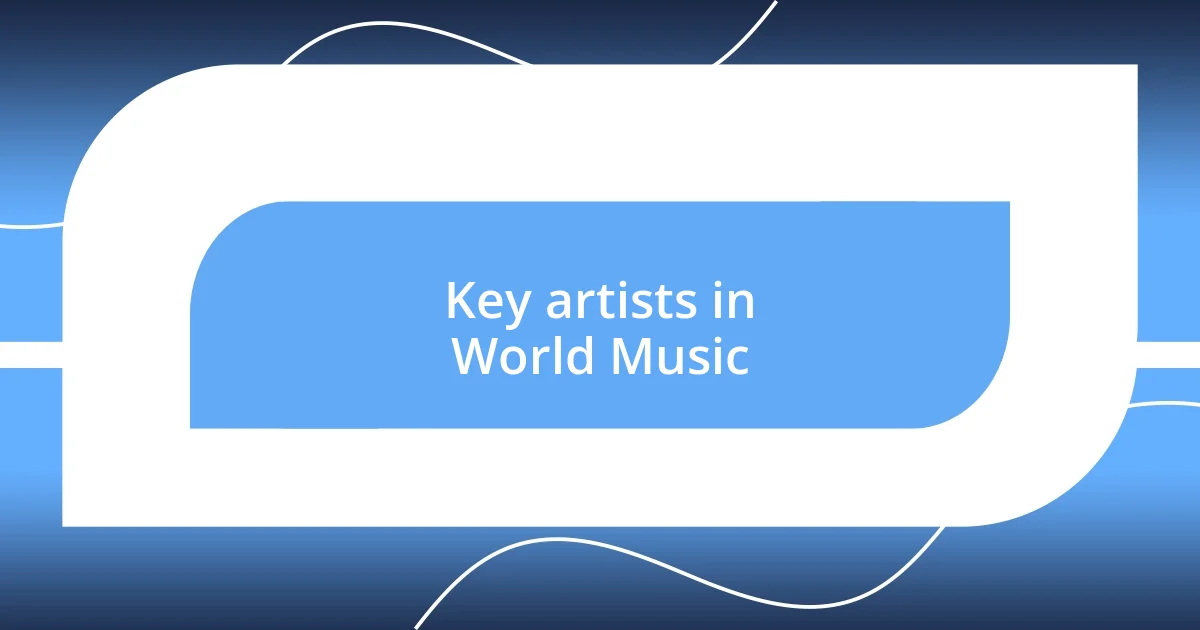
Key artists in World Music
Exploring the world of key artists in World Music brings a rush of excitement. Certain musicians stand out, not just for their talent but for their cultural influence. I remember listening to Youssou N’Dour’s “7 Seconds” for the first time—it was like a musical awakening. His voice, infused with West African rhythms, carries deep emotions that resonate universally.
Here are some key artists who have made significant contributions to World Music:
- Youssou N’Dour: Famed for his extraordinary vocal range and blending of traditional Senegalese music with pop.
- Buika: A Spanish singer whose soulful voice captures the essence of flamenco and Afro-Cuban rhythms.
- Tinariwen: A group of Tuareg musicians from Mali known for their unique blend of traditional desert blues with rock influences.
- Anoushka Shankar: Renowned sitar player who brings Indian classical music into contemporary genres, showcasing the beauty of her heritage.
- Angelique Kidjo: A Beninese artist celebrated for her dynamic fusion of African music styles with jazz, pop, and Caribbean influences.
Each of these artists has a story to tell through their music, offering a glimpse into their cultural roots. I often find myself drawn to their performances, where every note feels like a conversation we’re having across continents. It makes me realize that while we might be worlds apart, music can unite us in ways that words often can’t.
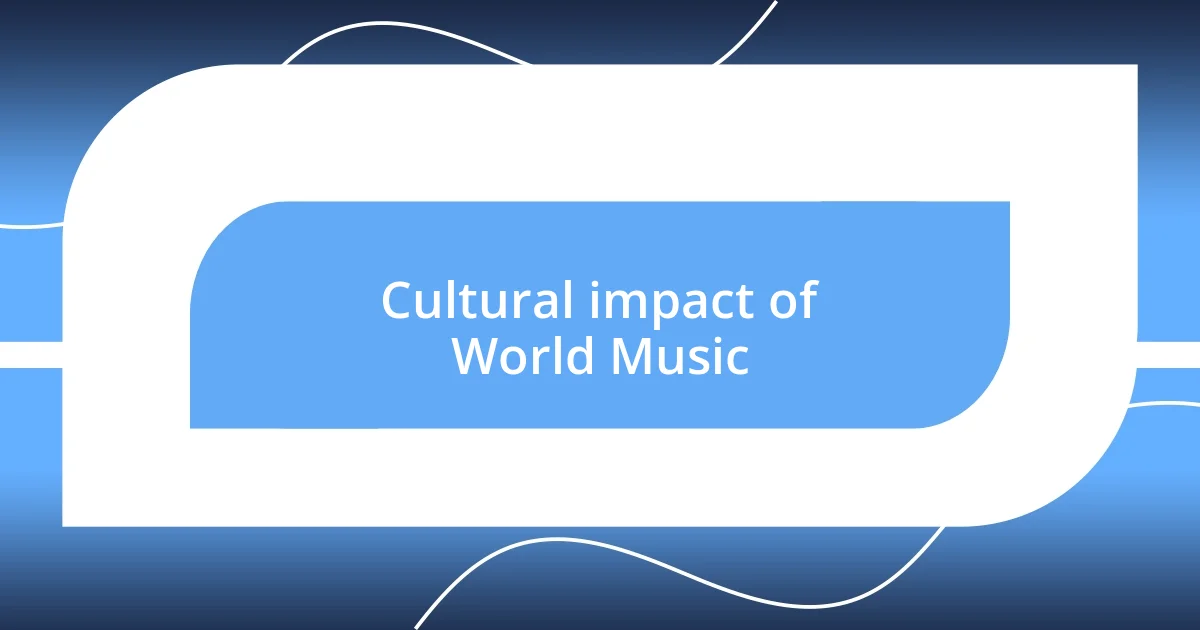
Cultural impact of World Music
World Music has a profound cultural impact that often transcends borders. I remember one evening at a small world music festival, where I was mesmerized by a band playing intricate rhythms from India alongside a guitarist strumming folk tunes from a small town in Mexico. It was heartwarming to watch the audience, filled with people from all walks of life, coming together in a shared appreciation of these diverse sounds. This experience reinforced my belief that music serves as a universal language, capable of bridging cultural gaps.
The blending of musical styles has also sparked significant conversations about identity and cultural heritage. I once met an artist who identified as a “cultural alchemist,” passionately merging elements of hip-hop with traditional African drumming. His words still resonate with me: he said, “I’m not just creating music; I’m crafting a narrative that honors my past while looking toward the future.” Isn’t it incredible how World Music encourages such dialogues? It not only celebrates cultural roots but also invites us to think about who we are within the global tapestry of sound.
Listening to World Music can be a transformative experience that enlightens the mind and spirit. I recall a night spent with friends, sharing playlists filled with rhythms from around the globe. Each song sparked a conversation about the cultures behind the music, and we found ourselves engaged in a vibrant discussion about traditions we wanted to learn more about. It made me realize that World Music isn’t just entertainment; it’s a communal experience that fosters understanding, empathy, and even a bit of wanderlust for different cultures. After all, isn’t discovering the world through sound one of the most enriching journeys we can embark on?
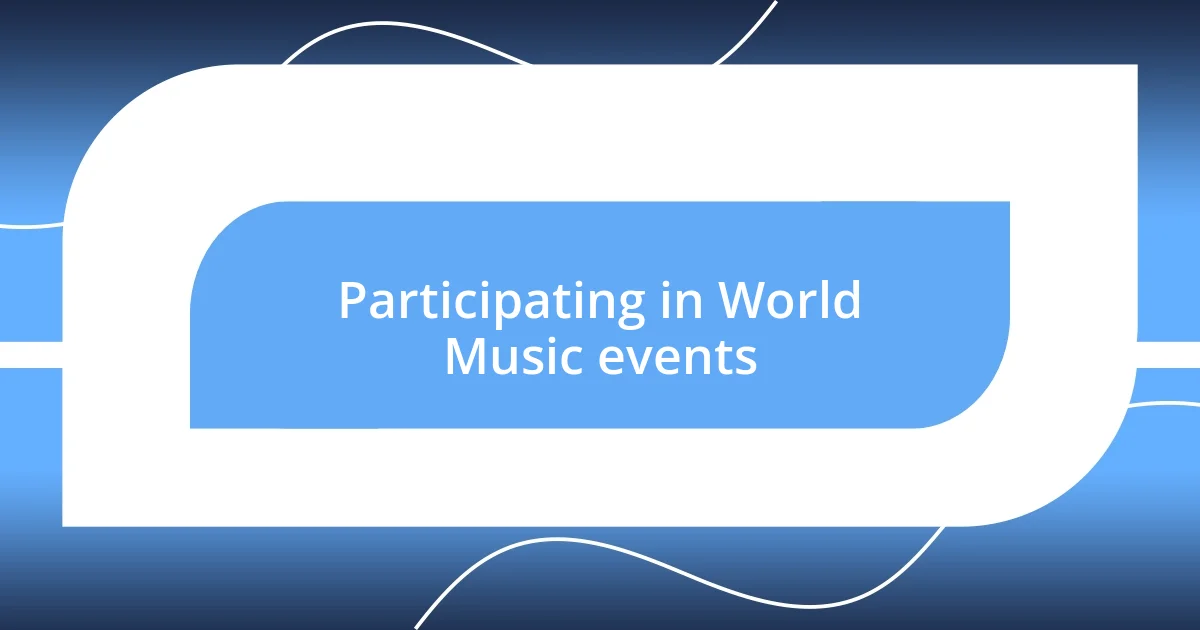
Participating in World Music events
Participating in World Music events has been a whirlwind of joy and discovery for me. I vividly recall attending a vibrant festival where musicians from various backgrounds shared their traditions on one stage. As I joined in the clapping, swaying along with the rhythms, it felt like I was part of something much larger than myself—a collective celebration of diversity that pulsed through the air. Have you ever felt that sense of belonging in a crowd, united by sheer passion for music? It’s an indescribable feeling.
I’ve also discovered that each event carries its own unique energy, shaped by the artists and their cultural narratives. At one concert, a Brazilian samba group invited the audience to get involved—suddenly, everyone was dancing, laughing, and connecting through the joy of movement. This experience made me realize that World Music events aren’t just performances; they’re invitations to interact, learn, and partake in a cultural exchange that leaves a lasting imprint on our hearts. It begs the question: how often do we allow ourselves to step out of our comfort zones and truly immerse in another culture?
In my experience, World Music events also serve as platforms for important dialogues. I remember chatting with a musician from Italy who shared how his songs encapsulated stories from his childhood, intertwined with themes of longing and hope. Listening to him was like peeling back layers of history, exposing the raw emotions behind every note. His perspective challenged my own understanding of music’s role in storytelling, reminding me that each sound can evoke profound feelings and social commentary. Isn’t it fascinating how music can not only entertain but also provoke thought and conversation?




